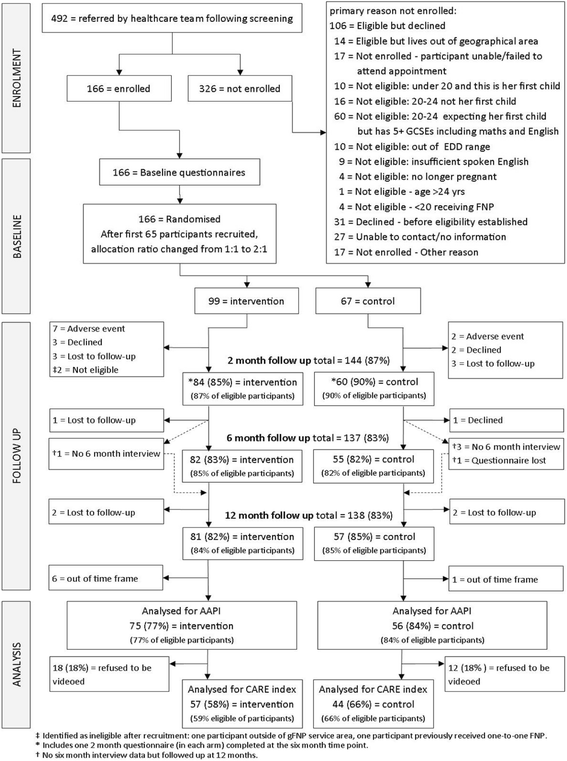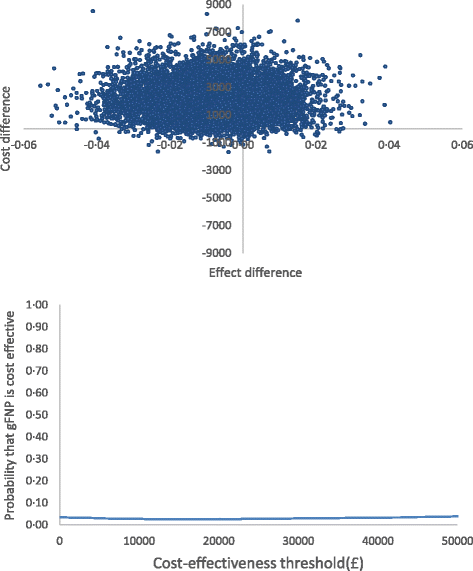Randomized controlled trial and economic evaluation of nurse-led group support for young mothers during pregnancy and the first year postpartum versus usual care
- PMID: 29092713
- PMCID: PMC5667036
- DOI: 10.1186/s13063-017-2259-y
Randomized controlled trial and economic evaluation of nurse-led group support for young mothers during pregnancy and the first year postpartum versus usual care
Abstract
Background: Child maltreatment is a significant public health problem. Group Family Nurse Partnership (gFNP) is a new intervention for young, expectant mothers implemented successfully in pilot studies. This study was designed to determine the effectiveness and cost-effectiveness of gFNP in reducing risk factors for maltreatment with a potentially vulnerable population.
Methods: A multi-site, randomized controlled, parallel-arm trial and prospective economic evaluation was conducted, with allocation via remote randomization (minimization by site, maternal age group) to gFNP or usual care. Participants were expectant mothers aged below 20 years with at least one live birth, or aged 20-24 years with no live births and with low educational qualifications. Data from maternal interviews at baseline and when infants were 2, 6 and 12 months, and video-recording at 12 months, were collected by researchers blind to allocation. Cost information came from weekly logs completed by gFNP family nurses and other service delivery data reported by participants. Primary outcomes measured at 12 months were parenting attitudes (Adult-Adolescent Parenting Index, AAPI-2) and maternal sensitivity (CARE Index). The economic evaluation was conducted from a UK NHS and personal social services perspective with cost-effectiveness expressed in terms of incremental cost per quality-adjusted life year (QALY) gained. The main analyses were intention-to-treat with additional complier average causal effects (CACE) analyses.
Results: Between August 2013 and September 2014, 492 names of potential participants were received of whom 319 were eligible and 166 agreed to take part, 99 randomly assigned to receive gFNP and 67 to usual care. There were no between-arm differences in AAPI-2 total (7 · 5/10 in both, SE 0.1), difference adjusted for baseline, site and maternal age group 0 · 06 (95% CI - 0 · 15 to 0 · 28, p = 0 · 59) or CARE Index (intervention 4 · 0 (SE 0 · 3); control 4 · 7 (SE 0 · 4); difference adjusted for site and maternal age group - 0 · 68 (95% CI - 1 · 62 to 0 · 16, p = 0 · 25) scores. The probability that gFNP is cost-effective based on the QALY measure did not exceed 3%.
Conclusions: The trial did not support gFNP as a means of reducing the risk of child maltreatment in this population but slow recruitment adversely affected group size and consequently delivery of the intervention.
Trial registration: ISRCTN78814904 . Registered on 17 May 2013.
Keywords: Child maltreatment; Early intervention; Nurse; Pregnancy; Young parenthood.
Conflict of interest statement
Ethics approval and consent to participate
The study was granted approval by the UK National Research Ethics Service Committee South West-Frenchay (REC reference 13/SW/0086). All participants gave written informed consent to participate, with additional informed consent for the 12-month video-recording of the mother-child interaction.
Competing interests
Geraldine Macdonald is in the process of completing a Cochrane Review of home visiting programs that will include studies of Nurse Family Partnership. Two predecessor reviews were withdrawn in response to a criticism by David Olds. The criticism did not materially affect the results or conclusions of the reviews, but it was deemed appropriate to correct these and republish. This work is in hand, but the results are not yet available. The authors declare that they have no competing interests.
Publisher’s Note
Springer Nature remains neutral with regard to jurisdictional claims in published maps and institutional affiliations.
Figures


References
-
- Department for Education (DfE) Statistical first release SFR27/2010. London: Department for Education; 2012.
-
- Wave Trust . Conception to age 2: the age of opportunity. London: Wave Trust; 2013.
-
- Leadsom A, Field F, Burstow P, Lucas C. The 1001 critical days: the importance of the conception to age two period: a cross party manifesto. London: Department of Health; 2013.
Publication types
MeSH terms
Grants and funding
LinkOut - more resources
Full Text Sources
Other Literature Sources

